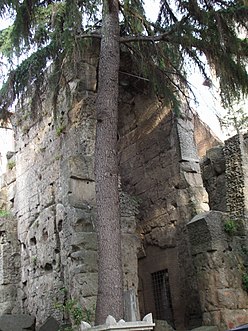Castra Albana
| Castra Albana | |
|---|---|

The central arch of the porta Praetoria of the castra
|
|
| Founded during the reign of | Septimius Severus |
| Province | Italia |
| — stone structure — | |
| Size and area | 437 m x 239 m (9.5 ha) |
| — Legions — | |
| Legio II Parthica | |
| Town | Albano Laziale |
| County | Roma |
| State | Lazio |
| Country | Italy |
The Castra Albana [ˈkastra alˈbaːna] was a permanent legionary fortress of the Legio II Parthica, founded by the Emperor Septimius Severus (193-211) on the modern site of Albano Laziale. Today, the ruins of the structures inside the castra, such as the so-called Baths of Caracalla and the Amphitheatre represent one of the largest collections of Roman archaeological remains in Latium, outside of Rome.
The fortress of Legio II Parthica was named Albana making reference to the legendary capital of the Latin League, Alba Longa, founded by Ascanius, the son of Aeneas, thirty years after the foundation of Lavinium, "Near a mountain and a lake, sitting in the space between the two The most common location suggested for this ancient mothercity of Rome today is the south side of Lake Albano, between Colle dei Cappuccini in the comune of Albano Laziale and the Convent of St Mary ad Nives of Palazzolo in Rocca di Papa.
Related names in the area included Lacus Albanus, Mons Albanus, aqua Albana (perhaps an aqueduct on the south side of the lake), the rivus Albanus (probably the modern marana delle Pietrare near Marino) and "Albani Longani Bovillenses", the official name of the inhabitants of the municipium of Bovillae (located on the Appian Way near the modern village of ), The adjective Albanus was also used as a poetic synonym for Romanus.
...
Wikipedia
